Key takeaways:
- Respect and dignity are essential for fostering meaningful interactions and enhancing individuals’ sense of worth.
- In pro-life advocacy, prioritizing respect facilitates open conversations and promotes understanding among differing viewpoints.
- Core principles of pro-life advocacy emphasize the inherent value of every life and the importance of community support in challenging circumstances.
- Creating safe spaces for dialogue encourages empathy and uplifts marginalized voices, enhancing the collective mission to protect life.
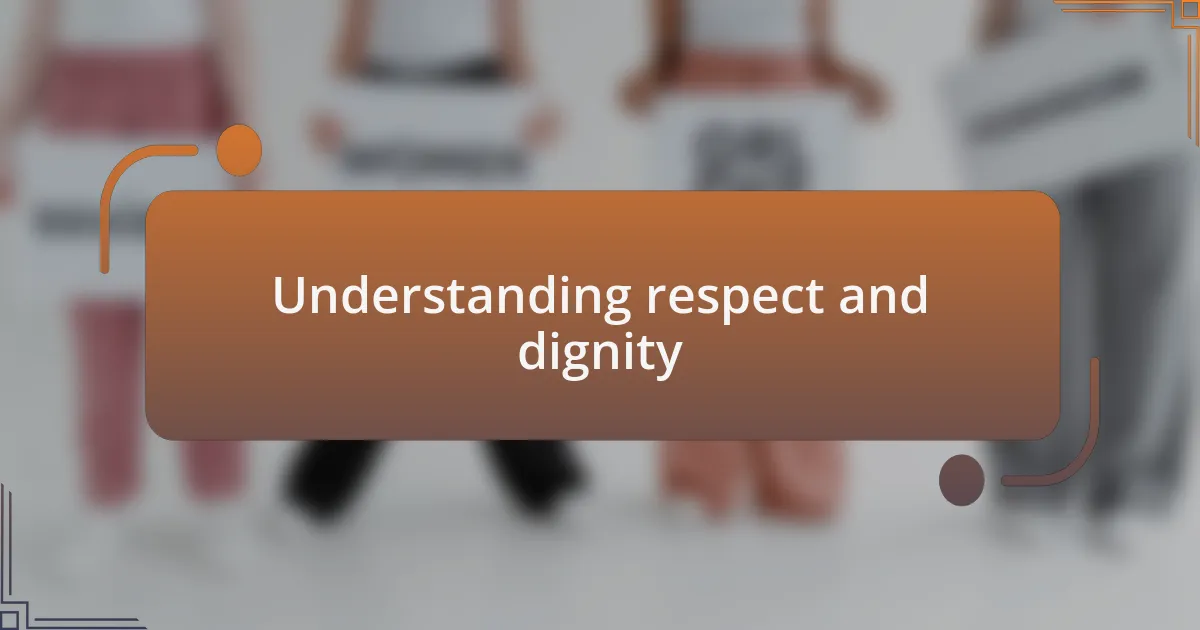
Understanding respect and dignity
Respect and dignity are fundamental aspects of our interactions with others, yet their meanings can sometimes be overlooked in our busy lives. I remember a moment when I encountered a stranger who was struggling—seeing their vulnerability reminded me that everyone deserves kindness and acknowledgment, regardless of their circumstances. Have you ever stopped to consider how a simple act of respect can profoundly impact a person’s sense of worth?
The concept of dignity often intertwines with how we treat ourselves and those around us. For instance, I’ve observed that when individuals are treated with dignity, they tend to rise to meet expectations and often surprising levels of character. Isn’t it fascinating to think that our perception of another’s worth can influence their actions and self-esteem?
Furthermore, understanding respect is about recognizing the inherent value each person possesses. It challenges us to listen actively and validate others’ experiences. I’ve found that when I approach conversations with this mindset, it opens the door to deeper connections and insights that I might have otherwise missed entirely. How might our world change if we committed to embracing this principle in our daily interactions?
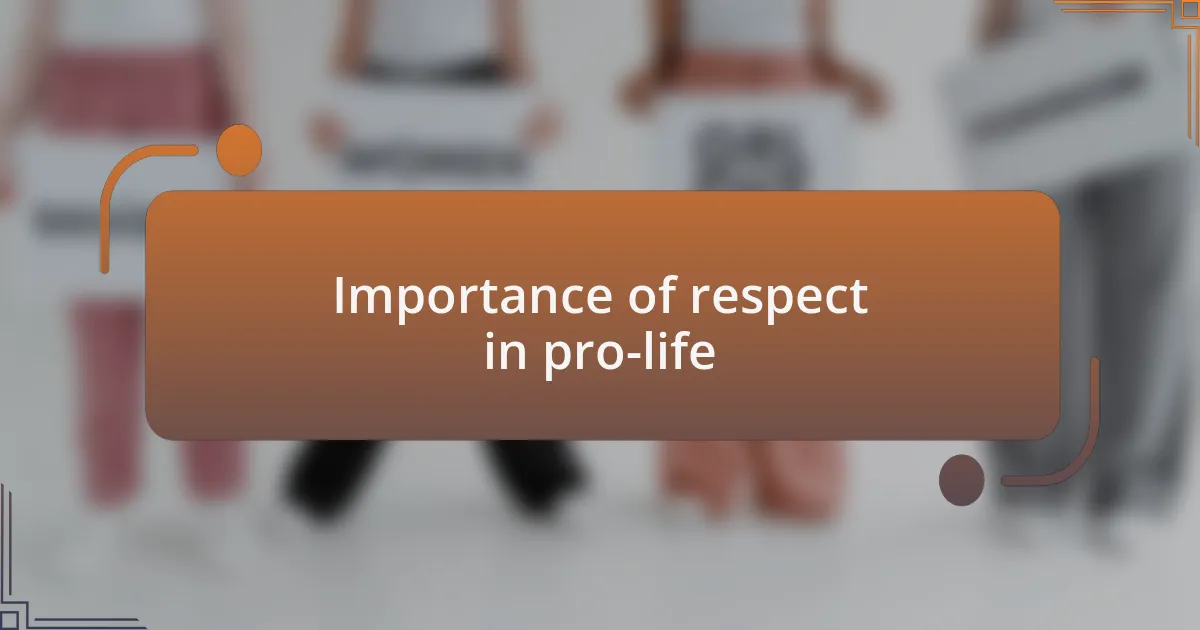
Importance of respect in pro-life
Respect plays a vital role in pro-life advocacy, as it directly influences how we communicate the value of life to others. I recall a time when I engaged in a discussion with someone who held opposing views. Instead of attacking their beliefs, I chose to listen actively. That choice transformed our exchange into a meaningful dialogue rather than a heated debate, highlighting that respect can be a bridge to understanding.
When we emphasize respect in our pro-life efforts, we foster an environment that encourages open conversations about life’s sanctity. I often think about how the tone we use can either uplift or alienate those who might seek compassion or clarity. By choosing words that reflect respect for all perspectives, we not only honor the individual but also strengthen our mission to advocate for life.
Moreover, respect paves the way for respect to be reciprocated. I’ve seen how communities thrive when they prioritize kindness and understanding; it creates a ripple effect that softens even the hardest of hearts. If we expect others to consider our viewpoint, shouldn’t we also show willingness to acknowledge theirs with grace? This thoughtful approach cultivates a more inclusive and impactful advocacy.
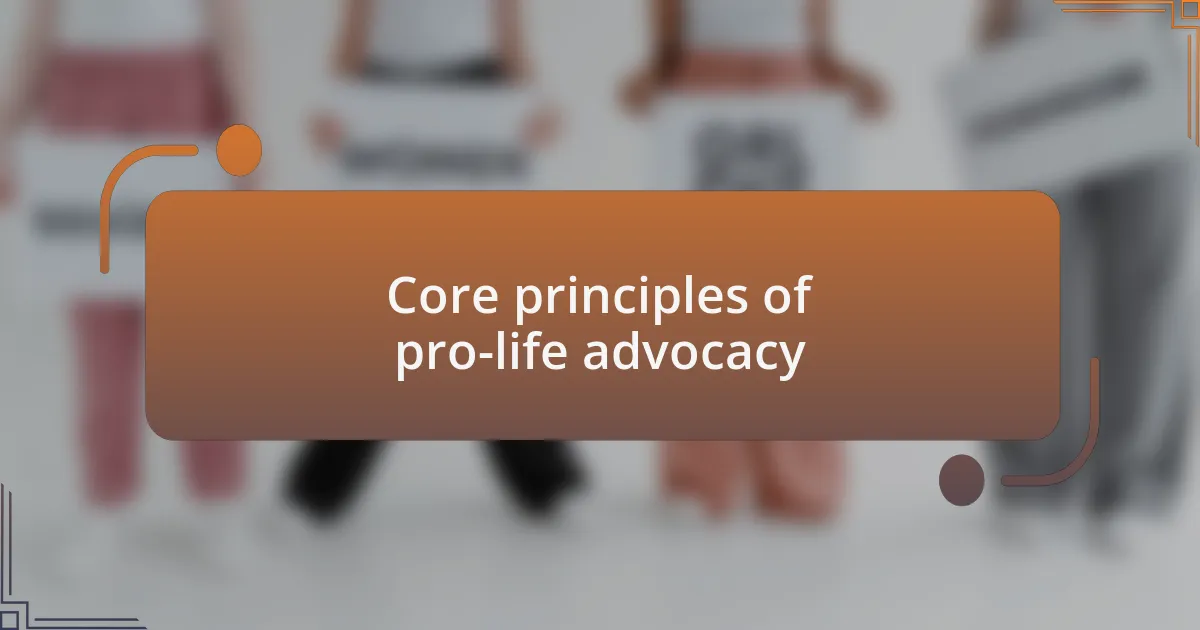
Core principles of pro-life advocacy
Core principles of pro-life advocacy center around the inherent value of every human life. From my experience volunteering at a crisis pregnancy center, I learned that every individual we encounter has a unique story worthy of respect. This principle not only guides our interactions but is essential in conveying our message with sincerity.
Another critical element is the belief in community support for those facing challenging circumstances. I remember a mother who was unsure about her pregnancy, and when she saw a supportive network rally around her, she felt empowered to choose life. It’s moments like these that affirm the power of solidarity—we can uplift each other in ways that foster hope and dignity.
Lastly, educating ourselves and others about the complexities surrounding life issues is essential. I’ve often engaged in thoughtful discussions about why some might choose abortion, and these conversations have deepened my understanding and compassion. It’s crucial that we approach these dialogues with curiosity and a genuine desire to comprehend diverse viewpoints, as this enriches our advocacy and reinforces our commitment to respect and dignity.
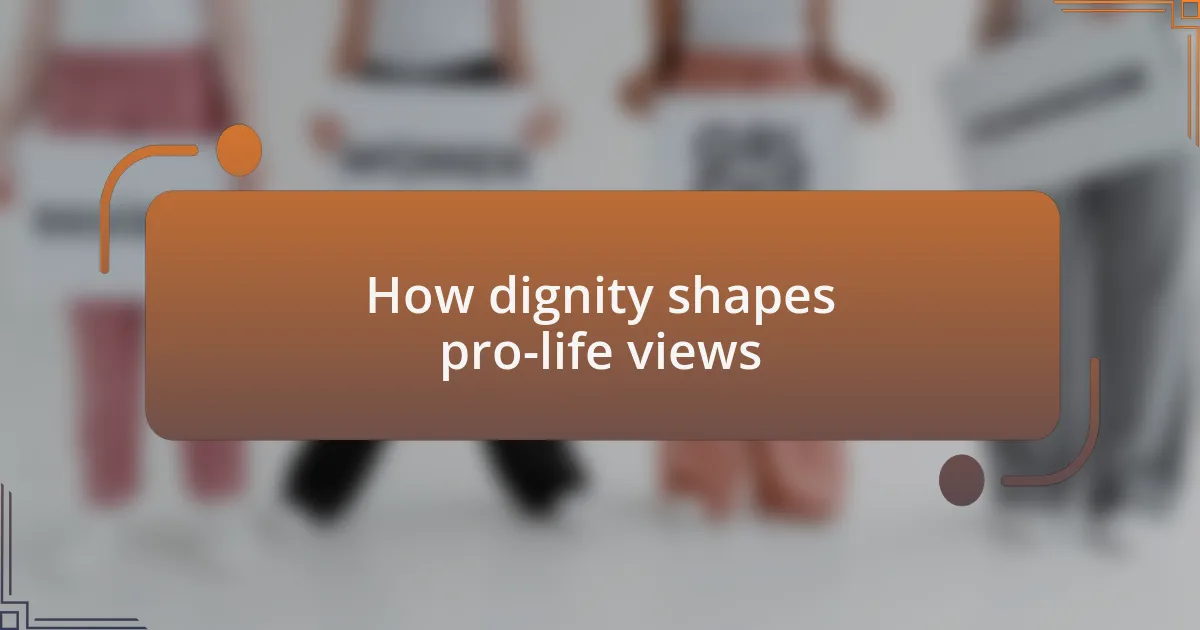
How dignity shapes pro-life views
Respecting the dignity of life fundamentally shapes pro-life views by affirming that every person, regardless of their circumstances, possesses inherent worth. I remember speaking with a young woman who felt trapped by her situation; I was struck by her vulnerability and the profound desire she had for respect and understanding. In moments like these, it becomes clear that recognizing each individual’s dignity can change the narrative around life choices.
Furthermore, dignity also plays a critical role in how we communicate the pro-life message. I once attended a community discussion where a mother shared her experience of feeling judged for her unplanned pregnancy. Her desire for dignity resonated deeply with the audience, shifting the conversation from one of condemnation to one of empathy. How do we ensure that our advocacy reflects that same understanding? It requires us to actively listen and affirm the stories of those we seek to support, fostering a culture where every life is valued.
Ultimately, the interplay between dignity and pro-life ideals encourages a more compassionate approach to advocacy. Reflecting on my experiences, I’ve seen how providing safe spaces for dialogue can uplift marginalized voices. Shouldn’t all individuals have the opportunity to express their fears and hopes? Creating such an environment not only uplifts the individuals involved but also enhances our collective mission to protect life at all stages.
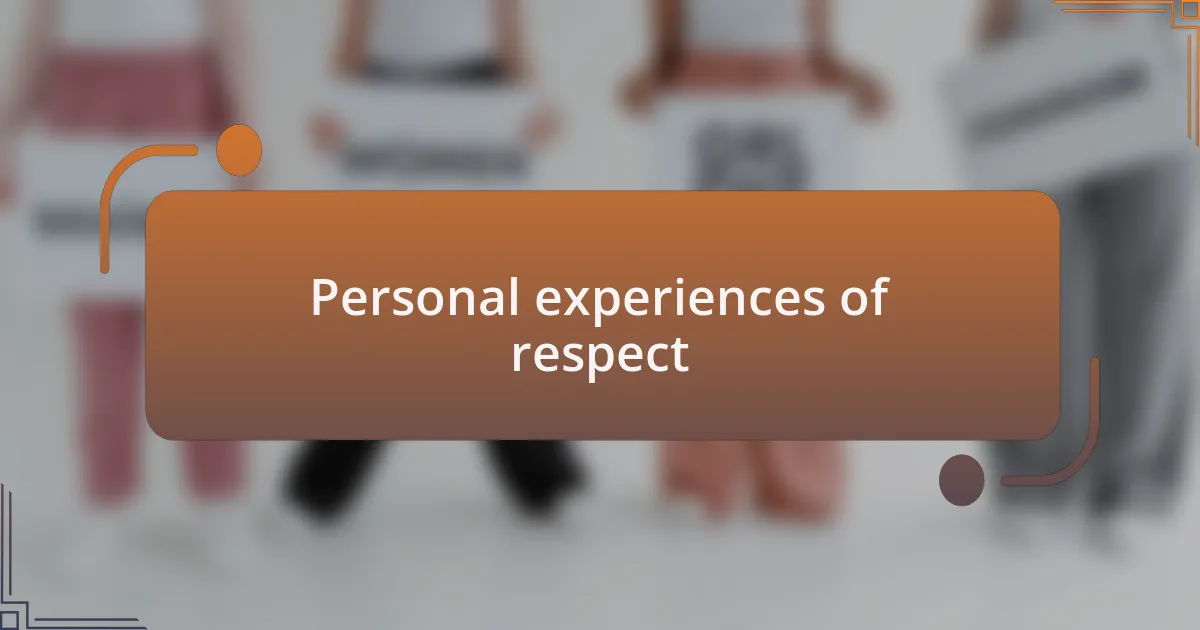
Personal experiences of respect
Reflecting on respect reminds me of a volunteer experience at a local pregnancy center. I met a young father who was wrestling with the immense pressure of providing for his family. As we spoke, I could sense the relief washing over him when he felt listened to without judgment. It struck me how significant respect can be—just taking the time to understand his fears not only validated his experiences but also ignited a sense of hope within him.
Another memorable encounter was with an elderly woman who shared her struggle with a recent terminal diagnosis. She spoke of how, throughout her life, her dignity had been challenged in many ways, especially during healthcare decisions. Hearing her articulate the need for respect in such vulnerable moments was enlightening. It made me realize that respect is not just about kindness; it’s also about honoring each person’s journey, regardless of the obstacles they face.
I often wonder how our communities could shift if we prioritized respect in our dialogues about life. One day, while facilitating a workshop on pro-life advocacy, an attendee opened up about a missed opportunity to support a friend in crisis. Her story made me reflect on the responsibility we hold to uplift one another. When we approach conversations with an attitude of respect, we can transform lives—not just through our words but through our actions and the empathy we extend to others.
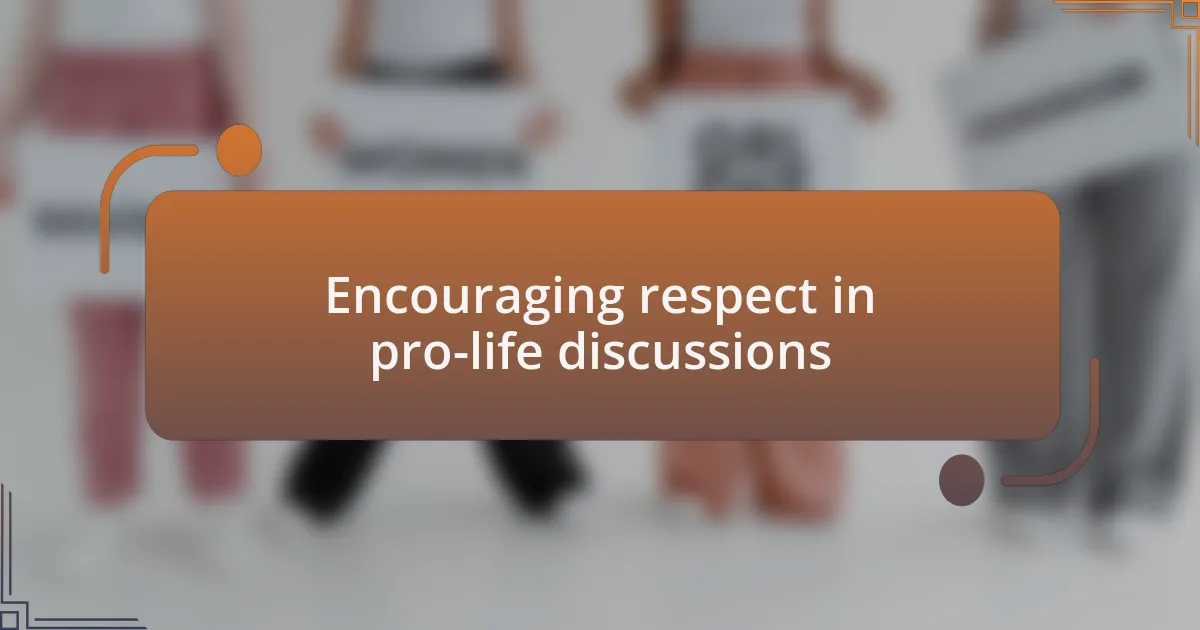
Encouraging respect in pro-life discussions
In pro-life discussions, I’ve noticed that the tone we adopt shapes the conversation. I remember a heated debate in a community meeting where one woman passionately shared her stance, and while her conviction was admirable, the dismissive responses from others only fueled the conflict. It made me realize that fostering a respectful environment is essential; when we dismiss opinions, we shut down the potential for meaningful dialogue.
Once, during an online forum, I encountered a participant who held vastly different views about pregnancy choices. Instead of jumping into a rebuttal, I took the time to understand her perspective. Her story revealed not only her convictions but also the pain of her experiences. It hit me how respect allows for deeper connections; when we listen authentically, we uncover shared humanity that transcends our differences.
I often ask myself: how can we create safe spaces for open discussions where everyone feels valued? From my experiences, I’ve found that starting with common ground—acknowledging our shared desire for life and well-being—sets a collaborative tone. When we approach conversations centered on respect, we invite others to engage with us openly, which can ultimately lead to personal growth for everyone involved.